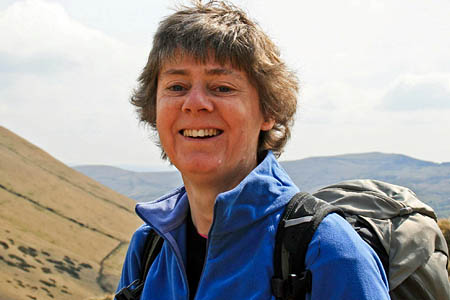Walking campaigners have expressed alarm at plans to cut countryside access services in one of England’s most popular outdoor destinations.
Aficionados of Alfred Wainwright, whose series of Pictorial Guides to the Lakeland Fells can be found in the rucksacks of many a fellwalker in Cumbria, called the proposals a false economy, and pointed out the county’s economy benefits to the tune of £2bn a year from tourism.
The Wainwright Society was responding to Cumbria County Council’s consultation on its budget priorities and options, which include reducing countryside access service spending to the statutory minimum. The society said this would put at risk the improvement achieved in the county’s rights of way system over the last few years.
It also said the slashing of Government grant-aid to support the maintenance of national trails could put sections of the Pennine Way and Hadrian’s Wall Path at risk of deterioration.
Broadcaster and writer Eric Robson accompanied Wainwright on many of his outings while trying to coax conversation out of the notoriously taciturn writer. He is chairman of the Wainwright Society and also of Cumbria Tourism and said: “Many of these threatened changes are the worst sort of false economy.
“We already get an internationally renowned footpath system on the cheap, relying on volunteers and charitable donations for much of the work. If the quite small sums of enabling public finance are now to be removed, huge and lasting damage will be done to an industry that contributes £2bn a year to the Cumbrian economy.”
The Wainwright Society is campaigning for national-trail status for both Wainwright’s Coast to Coast Path and the route of A Pennine Journey, the young writer’s first long-distance foray. Both routes have substantial sections within Cumbria.
And campaigners responded angrily to a threat to scrap the whole countryside access team in the heart of England.
Warwickshire County Council’s head of transport and highways Graeme Fitton said he is taking a closer look at the council’s access team service ‘with a view to deciding whether it will continue to be provided and, if so, in what form’.
The Open Spaces Society said cutting the countryside team would be a false economy. “The work of these few, hardworking staff in maintaining the county’s network of public paths is not only of immense value to the public but it generates income for the county,” the OSS’s general secretary Kate Ashbrook said.
“Those visiting Warwickshire for recreational walking, riding and cycling spend money in the shops and on accommodation and meals. It is well know that these activities contribute massively to the rural economy.
“Public paths and access land provide excellent value for money. For relatively little expenditure, a wonderful resource is maintained and improved, for everyone to enjoy. It serves far more people than indoor recreational facilities, and at a fraction of the cost.”
Echoing the Wainwright Society’s concerns at the potential decline in footpaths, Ms Ashbrook said rights of way would deteriorate, and visitor numbers decline. She also warned the OSS’s members would take legal action if the council failed its legal obligations.
Ms Ashbrook said: “The county council has a statutory duty to assert and protect the rights of the public to use and enjoy the paths and to keep them clear of obstructions.
Addressing Mr Fitton, she said: “If the county neglects this duty, our members and others will serve notices, requiring you to do the necessary work or face court action. The council could easily find itself in court, having to explain why it is ignoring its statutory duties on public paths.
“We should like to work with you in determining where savings might be made which do not prejudice the path network and countryside access, but we cannot do this while you are threatening to abolish the countryside access team. If you withdraw this threat, we shall be willing to talk.”
In December, Ramblers’ chief executive Tom Franklin accompanied walkers in Greater Manchester to see at first hand the problems which would arise with the planned axing of Bolton Council’s entire rights of way team.
The Institute of Public Rights of Way and Access Management, which represents professional staff in the field, joined the Ramblers in highlighting the effects of the cutbacks and the ability of the public to enjoy the great outdoors. The two bodies are urging Bolton Council to reverse the decision.
“Such drastic cuts will not only leave Bolton with no dedicated staff to manage the footpath network but without staff to provide expertise, training and co-ordination, volunteers will be unable to help too.
“Funding for rights of way is relatively small compared to the benefits they can bring and we are urging Bolton Council to reconsider this decision,” Mr Franklin said.

